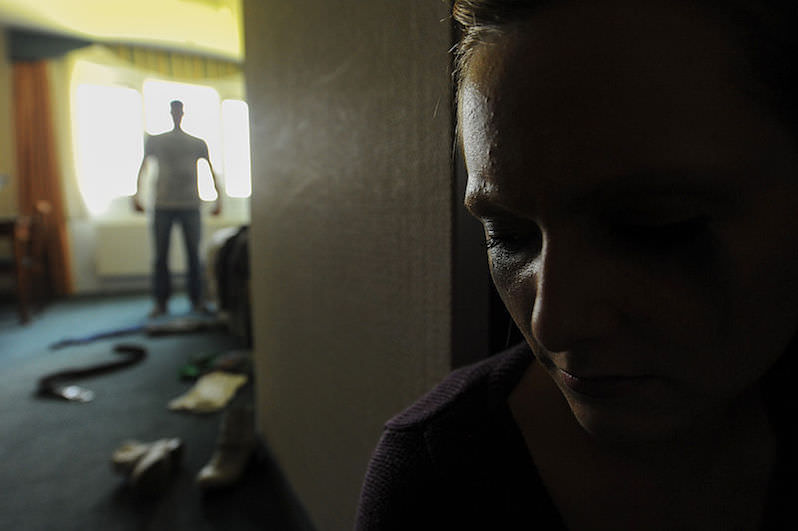From Childhood Victim to Domestic Abuse Survivor
Sexism and misuse of religion shattered a girl's self-image and robbed her of the ability to defend herself. A photo-illustration suggests the effects of domestic violence. (U.S. Air Force photo by Senior Airman Rusty Frank)
A photo-illustration suggests the effects of domestic violence. (U.S. Air Force photo by Senior Airman Rusty Frank)
By Barbara Dunlap and Ann Laird
Battered women come from all walks of life. They can be college graduates or high school dropouts. They may be financially secure or struggling to put food on the table.
The reasons that victims stay in abusive situations are diverse as well. Poor women often literally have no other place to go. Those in higher socio-economic brackets might have the resources to leave but endure the abuse for a variety of social and psychological reasons.
Ann Laird belongs in the latter group. She’s a well-educated, financially secure woman who lived with a man who beat her continually until she suffered brain damage. She had the means to leave, but she remained with her abuser because her upbringing had robbed her of the ability to defend herself. Raised in a Christian household beset by sexism, Ann learned as a child to accept whatever happened to her.
Ann was a good friend of mine in college, but I had no idea she carried such deep scars from childhood. Years later, I was stunned to learn she’d become a victim of domestic abuse.
When Truthdig launched this series on violence against women, I asked my friend to share her experiences. Ann agreed; here is her story of devastation and healing.
To fellow students, Ann looked very much her own woman as she walked around our college campus dressed in blue jeans and an oversized shirt, and usually barefoot. She was highly intelligent and did well academically. But Ann never mentioned that she regarded school as a refuge from her damaged—and damaging—home.
“My education had always given me a diversion from my family life,” she told me recently. “It built [up] my self-image that had been badly bruised as I grew up.” She elaborated:
My mother seemed to have a grudge against me since my birth. She used a withering tone of voice with me I never heard her use with anyone else. She sided with my older brother in arguments and frequently criticized and punished me for shirking family duties not expected of my brother.
I specifically remember her refusing to allow me to attend a scouting event until I had changed my bedsheets. We argued. Me: “I’m going to be late; I can do it when I get back.” She: “You are a member of this family and have to fulfill your responsibilities like everyone else.” As I left, late, for my event after changing my sheets, I passed my mother in my brother’s room, changing his sheets. He had gone, with her permission, to a scouting event. I felt like I’d been slapped in the face.
School also gave me a refuge from my brother, who subjected me to everything from put-downs to pinches and punches. He took what my mother dismissed as understandable “sibling rivalry” to painful physical and emotional lengths.
Once, at a church picnic when we were teenagers, he soaked me with a garden hose in front of his laughing male friends. My mother condemned me for spoiling my clothes. When I told her my brother had done it, she smiled and replied, “Ah, boys will be boys.”
I finally stopped protesting this kind of treatment and learned to take what came my way. As a result, I never developed the skills to defend myself, even in the face of harm.
Other issues came from my upbringing as a preacher’s daughter. Teachings such as “turn the other cheek” provide no defense in the face of continuing abuse. Following these teachings gave me a life assumption that any exercise of power was immoral, even in self-defense. Another strong Christian message of “judge not” made it impossible for me to condemn those who mistreated me.
Growing up in demeaning circumstances robs many women of their ability to defend themselves, according to Jane Fredricksen, executive director of the FaithTrust Institute in Seattle. The institute provides faith communities with tools and knowledge to address issues related to abuse.
“Patriarchal constructs often perpetuate violence, both in and outside of religion,” Fredricksen says. “Religion can perpetrate silence and shame, but we believe that’s a misinterpretation of faith. The religious tenets of Judaism, Christianity and Islam don’t promote domestic violence in any way.”
Teachings such as “keep praying” are oversimplified, according to “A Commentary on Religion and Domestic Violence,” co-authored by Rev. Marie Fortune, who founded the FaithTrust Institute. “Although these teachings may be fundamental to many religious faiths, alone they are inadequate to deal with the complexity of such an experience … as domestic violence,” the commentary explains.
After college, Ann became a legal secretary and eventually a paralegal. Her significant relationships were close, long-term and affectionate. They usually were with older men, who eventually withdrew with no explanation. She came to expect emotional abandonment but didn’t suffer any physical abuse.
“Then one day I woke in my parents’ house recovering from brain damage,” she told me. “My folks said it was inflicted by a man with whom I’d been in a relationship. I didn’t remember him. I didn’t remember the injury. I didn’t remember he had habitually abused me, as my parents told me.” She went on:
As I recovered and tried to piece my life together, I saw a psychotherapist recommended by the district attorney who was trying to convict my abuser. This therapy helped me remember enough to lead that abuser to plead guilty, and he received the maximum sentence.
I can’t recall many other details—that part of my memory never has fully returned. I recall telling my parents and a friend I was being abused, but they couldn’t persuade me to leave. Because I don’t remember clearly, I can’t explain why I didn’t heed their advice.
But I strongly suspect the edicts of my childhood led me to stay in such a violent relationship. I had learned to be nice and polite no matter what, which turned out to be a recipe for victimization.
Ann can’t remember the details of why she remained with her abuser, but the fact that she stayed isn’t surprising—or uncommon. It’s one of the least understood aspects of domestic violence, according to Leslie Morgan Steiner, a survivor of abuse and author of the memoir “Crazy Love.”“The one question everyone always asks is, ‘Why does she stay? Why would anyone stay with a man who beats her?’ ” Steiner says in a TED talk titled “Why Domestic Violence Victims Don’t Leave.”
In her presentation, Steiner goes on to say, “Why did I stay? The answer is easy: I didn’t know he was abusing me. … I never once thought of myself as a battered wife. Instead, I was a very strong woman in love with a deeply troubled man.”
In addition to loving their abusers, victims stay in abusive relationships for other reasons, many of them listed by the Los Angeles Police Department on its website. A victim may have learned to be powerless, as in Ann’s case; she may suffer from Stockholm syndrome, identifying with her abuser; or she may fear leaving the batterer—a legitimate fear, as most domestic abuse-related murders occur after a victim departs.
Counseling provides help for many survivors like Ann by teaching them to think differently about things and helping them put those new thoughts into practice, according to “Counseling Services for Domestic Violence Survivors,” a report from the Domestic Violence Evidence Project.
“Therapy is imperative in rewriting the story and helping the person heal,” says Susan Weitzman, author of “Not to People Like Us—Hidden Abuse in Upscale Marriages.”
Weitzman offers healing retreats and counseling for women who have been abused. In an interview, she says that through therapy, women can “integrate their experience and get past the trauma.”
Ann’s batterer beat her so severely he felt compelled to take her to an emergency room, which, thankfully, marked the end of their relationship. Eventually Ann recovered enough to return to work, and she enjoyed several good years in a law office. She then began work as an administrative assistant in a large manufacturing company, which turned out to be a difficult work environment. Trying to meet the administrative needs of more than 140 engineers brought back childhood feelings of never meeting her mother’s expectations—and the buried fears of facing abuse if she failed to please.
“Eventually I sought counseling from a gifted therapist who was also, thankfully, an ordained minister,” Ann says. “He helped me resolve many lifelong issues that had led to my taking abuse.” She told me:
Under the guidance of my therapist, I confronted my mother about why she disciplined me much more strongly than she quelled my brother’s aggression against me. She replied that she was “shy” with him—because he was male. Her answer surprised me, but I understood it. Not only was she raised in a generation more deferential to males, but also her father had abandoned her family for another woman when she was small. Very probably, she was wary of any behavior that could alienate a male she loved.
I also confronted my mother’s resentment of me. In role-play, my therapist had me ask my “mother” what she had against me. He had me play the part of my mother and respond. I surprised myself by coming up with an answer: Because her father had abandoned her, and my father was there for us—for me—she was jealous.
Suddenly I understood. I didn’t have to like this, either, but I could fathom it. The next time I saw my mother, I told her what I had discovered. She didn’t verify or deny my interpretation, but she never mistreated me again.
In therapy, I discovered more about my relationship with my father as well. Since my early childhood, he and I had this unspoken agreement: “If I don’t get angry with you, you won’t get angry with me.” I carried this assumption into the world, expecting others to play by the same rules and becoming confused and ineffective when they didn’t.
Also, in role-play therapy, my counselor challenged me to tell my father why I was angry with him. After many protests that I was not angry with him, I finally began sobbing and asked my “father” why he had never defended me against my mother. When I took the question to my real father, he grasped immediately how his failure to defend me had led me to believe I was not entitled to defense—or self-defense.
I finally learned to deal with conflict in relationships—not by avoiding it or starting an argument I was likely to lose, but by calmly presenting the issues and my feelings and seeking a mutually satisfying solution. Equally important, I learned to leave the relationship if a solution wasn’t achieved. These tactics have proved very effective in one close relationship and brought a satisfying end to another.
I learned I had a right to seek support from friends, support groups, professionals and even law enforcement if necessary.
I resolved my difficult work situation when I achieved a promotion to another position that proved much more satisfying.
Ann also learned to resolve her faith issues in a healthier way.
“I reinterpreted the Christian messages of my childhood into a meaningful adult context for myself, ‘Do unto others’ and ‘turn the other cheek’ expanded to mean, ‘support the spiritual growth of others,’ ” she says.
“And supporting others requires me to stand up against their behaviors that cause harm.”
Barbara Dunlap is an award-winning journalist with years of writing and editing experience at publications such as the San Francisco Chronicle. She also served on the board of Winning Over Anger & Violence, a nonprofit working to end the cycle of violence in Central Oregon.
Ann Laird writes about topics such as women of power in America’s changing culture. Her work includes a Mensa article about the differences between growing up with a gifted education and “growing up” again without those supports following a brain injury.
Your support matters…Independent journalism is under threat and overshadowed by heavily funded mainstream media.
You can help level the playing field. Become a member.
Your tax-deductible contribution keeps us digging beneath the headlines to give you thought-provoking, investigative reporting and analysis that unearths what's really happening- without compromise.
Give today to support our courageous, independent journalists.






You need to be a supporter to comment.
There are currently no responses to this article.
Be the first to respond.